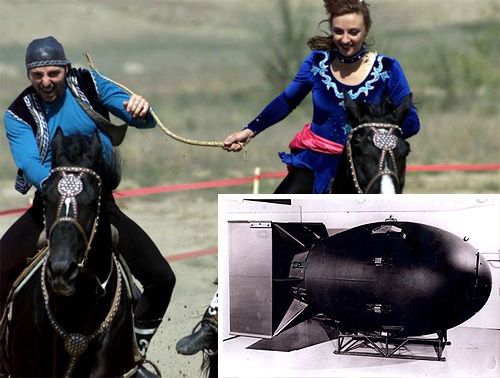
North Korea may have just shut down its reactor, but here’s something new to worry about: Kazakhstan, the Caspian country ruled by a man who has just effectively declared himself President-for-Life, may be on the verge of acquiring nuclear fuel processing technology. The only thing standing in the way would be a veto by the Bush administration, and given its close relationship with President Nursultan Nazarbayev’s energy-rich regime that doesn’t seem likely.
The scenario is as follows: Toshiba now owns 77 percent of Westinghouse, the U.S.-based nuclear power plant builder and operator. It wants to sell 10 percent of its stake to Kazatomprom (KAP), Kazakhstan’s state-run nuclear agency. According to accounts in the Japanese press and international news agencies, the transaction will require Toshiba and Westinghouse to transfer uranium-processing technology to KAP.
If the deal goes through, KAP would not operate a nuclear fuel-enrichment plant but it would produce uranium hexafluoride, or “hex,” which is “used in the uranium enrichment process that produces fuel for nuclear reactors and nuclear weapons.” Obtaining hex would certainly be of keen interest to any country seeking to develop nuclear weapons as it could be used as feed for its enrichment plants. (Added July 18 at 12:00PM–Furthermore, Kazakhstan has expressed an interest in getting centrifuges and enriching fuel according to Nucleonics Week, an industry publication.)
Nucleonics Week also says the deal would begin transforming KAP “from a uranium producer into a diversified player on the global nuclear market.” The article said that the “KAP buy-in to Westinghouse would be the first instance in which a part of the former Soviet civilian-military nuclear complex became a shareholder in a Western nuclear supplier company.”
Kazakhstan was praised for having voluntarily given up its nuclear weapons arsenal in 1992 after gaining independence from the former Soviet Union. But Nazarbayev’s government is considered to be widely corrupt and “there are reports that nuclear facilities and material are not secure, and there is evidence that people in Kazakhstan have ties to nuclear black-market activities,” according to James Love, head of the Washington-based group Knowledge Ecology International.
The sale of a stake in Westinghouse to a company in a third country requires the approval of the U.S. government. Today, Love’s group and three others, Greenpeace, Essential Action, and the Nuclear Information and Resource Service, wrote to the Treasury Department’s Committee on Foreign Investment in the United States to oppose the sale on the grounds that it would “undermine efforts to limit nuclear proliferation, and . . . give sensitive nuclear technology to a brutal, repressive and undemocratic regime.”
I ran the potential deal past Henry Sokolski, Executive Director of the Nonproliferation Policy Education Center, and he also expressed opposition. “It would essentially be encouraging a government to get into the nuclear fuel-making business,” he said. “That is always going to be a problem, especially in the case of a government like Kazakhstan’s.”
The fact that Kazakhstan has previously given up its nuclear arsenal does not eliminate concerns. “Whatever the economic arguments might be, there always ought to be an overriding security imperative to keep nuclear-fuel making plants out of countries that don’t currently have nuclear weapons,” he said. “If you have a fuel-making plant in the wrong place it doesn’t matter if there are international safeguards. You won’t be able to reliably know where all the nuclear material is and you don’t know where the expertise involved in running the plant may end up.”


